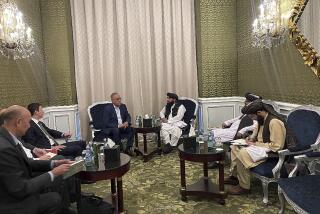Afghan Peace Hits Last-Minute Snag : Warfare: Fighting in Kabul delays arrival of U.N. envoy. Territorial gains of new militia throw accord into doubt.
- Share via
ISLAMABAD, Pakistan — The United Nations’ promising effort to broker peace in war-battered Afghanistan hit a last-minute snag on Friday because of renewed combat in the Afghan capital and the unclear intentions of the new major player in the conflict.
Shelling and rocketing in Kabul, which began overnight and continued through the morning, forced U.N. special envoy Mahmoud Mestiri to delay his flight from Islamabad, the capital of neighboring Pakistan.
News reports quoted hospital sources in the Afghan capital as saying that at least one person was killed and 15 others, including two children, were wounded as pro-government forces battled a Shiite Muslim faction, Hezb-i-Wahdat.
U.N. sources called the shelling in Kabul’s southwestern areas the most intense in recent months. But news reports indicated that it was nothing remarkable for Afghanistan’s most important city, which has been pounded into ruins by bitter infighting among rival Muslim factions.
Mestiri did fly later in the day on what was believed to be the first plane to land at Kabul airport in more than a year. He hopes to preside in the coming days over the creation of an interim council made up of leaders of rival civil war factions and Afghan personalities.
The council, the best hope in three years of bringing Afghanistan’s murderous strife to an end, is supposed to receive political power from President Burhanuddin Rabbani on Monday.
But the astonishing territorial gains of a new militia, known as the Taliban, or the Seekers, has now thrown the relevance of the U.N. blueprint into question and forced Mestiri to modify his plans.
In only six months, the Taliban, which diplomats and observers say began as a movement of students in madrasas , or Muslim religious schools, has taken control of one-third of the country, including the old royal capital of Kandahar and the No. 1 opium-poppy producing province, Helmand.
There seems to be no real disagreement that the Taliban’s lightning advance was behind the newfound willingness of rival Afghan militia leaders to agree to a power-sharing deal under U.N. auspices.
“They (the Taliban) have certainly facilitated our task,” said Francis G. Okelo, director of the Office of the U.N. Secretary General in Afghanistan and Pakistan.
But as the Taliban’s territorial gains mounted, it seemed more and more doubtful that it would settle for the role of mere catalyst.
On Tuesday, its fighters drove to within 10 miles of the Kabul city limits after routing the forces of Gulbuddin Hekmatyar, the main opposition leader, from their main headquarters south of Kabul.
Taliban leaders have publicly welcomed the U.N. role in trying to halt the warfare that broke out between rival moujahedeen groups after they overthrew the Communist government in April, 1992.
But the Taliban denounces the feuding Muslim groups as criminal and has declined until now to join the U.N.-brokered interim council.
Instead, the group is are demanding the disarmament of the warring factions and the reunification of Afghanistan under a central government and Islamic law.
Western diplomats who have had contacts with Taliban fighters say they are not Islamic fundamentalists but are conservative and traditionalist.
“This isn’t a repeat of Iran,” one stressed.
Taliban fighters were not involved in Friday’s fighting in Kabul, but their arrival at the capital’s gate forced changes in Mestiri’s itinerary and could scuttle the U.N.-brokered plan.
After arriving in Kabul, Mestiri met one-on-one with Rabbani at the Afghan president’s request. Today, Mestiri was to go to Hekmatyar’s old camp at Charasyab south of Kabul for direct contacts with the Taliban.
“This negotiation may take a few more days, but the day it (the transfer of power) happens is not important,” Mestiri told reporters at the U.N. compound in Kabul. “What is important is that we get the transfer right.”
Taliban fighters, chiefly from the Pushtun ethnic and linguistic group that predominates in southern Afghanistan, have demanded that members of the interim council be “good Muslims,” U.N. officials said. They also want the creation of a politically neutral army and a government where no party, ethnic or linguistic group dominates. Any of those demands could be enough to torpedo the 11-month-old U.N. peacemaking effort.
“Tomorrow we should know whether we have a green light, or a red light, or a yellow light as we do now,” Okelo said in Islamabad.
Under the U.N. plan, Rabbani, whose self-extended term expired Dec. 28, is to transfer power to a body of about two dozen Afghan leaders, including representatives of eight Islamic moujahedeen guerrilla factions.
“I think for the time being they (the Taliban) don’t say yes to the council and they don’t say no, but the main thing is that they don’t oppose it,” said Mestiri, a former Tunisian foreign minister. “Both sides have not agreed 100% on the list of names for the council, but we are pushing our preferred list.”
Reports from Kabul said Rabbani’s forces have partially complied with a Taliban demand earlier this week that they pull back from positions south of Kabul previously occupied by Hekmatyar’s Hezb-i-Islami militia, handing over the Rishkor Hills once used by Hekmatyar’s group to launch rockets on the city.
More to Read
Sign up for Essential California
The most important California stories and recommendations in your inbox every morning.
You may occasionally receive promotional content from the Los Angeles Times.













